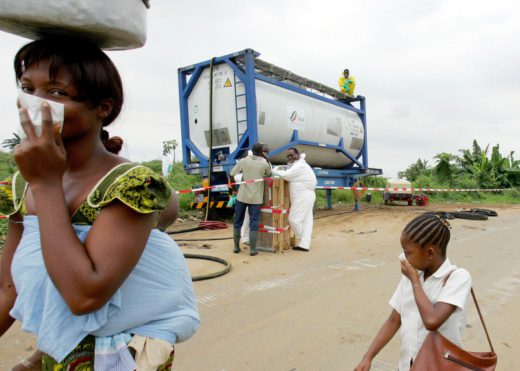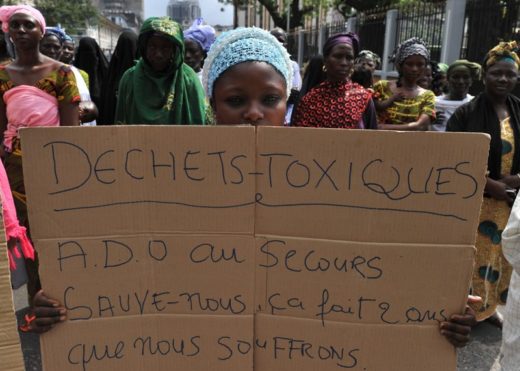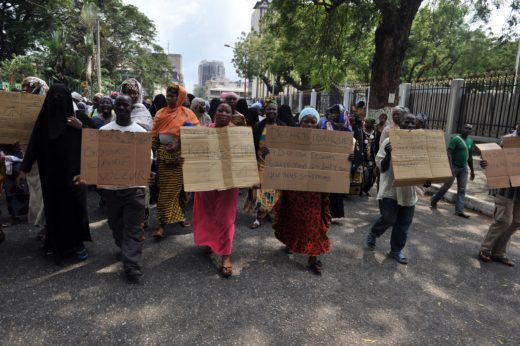Ten years ago, the cargo ship the Probo Koala reached the end of a four-month journey that resulted in toxic waste being dumped illegally in Côte d’Ivoire.
The sheer scale of the impact of the dumping created headlines around the world. More than 100,000 people needed medical assistance.
Multinational oil trading company Trafigura produced the toxic waste on board the ship as a result of refining a dirty petroleum product called coker naphtha to mix with gasoline and sell it on as petrol. Trafigura knew the waste was hazardous, but hadn’t figured out how to dispose of it safely.
Trafigura tried and failed to get rid of the waste in five countries: Malta, Italy, Gibraltar, The Netherlands and Nigeria. Its attempt to dispose of the waste in Amsterdam sparked an environmental incident when residents complained of the overwhelming smell and experienced nausea, dizziness and headaches after some of the waste was unloaded. Trafigura rejected an offer from a disposal company to deal with the waste safely in The Netherlands for the equivalent of US$620,000.
Instead, the toxic waste was finally dumped illegally in Côte d’Ivoire by a local company that Trafigura hired to dispose of it for just US$17,000 – a fraction of the price quoted in the Netherlands. To this day it is still not known where all the waste was dumped.
This is the story of a company putting profit over people and a community still waiting for justice and remedy.
I don’t know how we dispose of the slops and I don’t imply we would dump them, but for sure there must be some way to pay someone to take them.
Internal Trafigura email dated 10 March 2006


“High Costs”
The toxic waste was created on board the Probo Koala by a process known as ‘caustic washing’ which was used by Trafigura to ‘clean’ an extremely sulphurous, but cheap, petroleum product called coker naphtha.
Trafigura intended to mix the cleaned coker naphtha with gasoline and sell it as petrol to the West African market among others for a profit of around US$7 million per shipment.
Caustic washing produces a hazardous and highly-odorous waste product that is generically referred to as ‘spent caustic’. Very few facilities are prepared or able to deal with this kind of waste as it requires specialist handling. Trafigura knew this when it started caustic washing but had made no plan to dispose of the waste safely.
Between April and June 2006 Trafigura “washed” at least three shipments of coker naphtha on board the Probo Koala – this was the first time this process had been carried out at sea. It generated more than 500 cubic metres of toxic waste in the ship’s waste tanks.
Even at this stage, Trafigura had still not figured out how to dispose of the waste.
Trafigura tried to get rid of it in Amsterdam by disguising it as less hazardous waste – but it was rejected when the disposal company realised it was more contaminated than they thought. The company asked for €544,000 (then around US$620,000) to dispose of the waste safely. Trafigura rejected this offer because of the ‘high cost’.
Trafigura also tried and failed to dispose of the waste in Lagos, Nigeria for just US$7,000.
Claude owns a waste disposal company and wants us to be creative. Graham has worries that it will all turn black. Me and Leon want it cos each cargo should make 7m!!
Email between Trafigura staff in December 2005
The Toxic Journey: Key Numbers


19 August 2006
The toxic waste was finally dumped illegally in Abidjan, Côte d’Ivoire by a local company, Compagnie Tommy, that Trafigura hired to dispose of it for just US$17,000.
On the night of 19 August 2006, lorries dumped the toxic waste in at least 18 locations in and around the main city of Abidjan.
On 20 August 2006, the people of Abidjan woke up to the appalling effects of the dumping. Tens of thousands of people experienced a range of similar health problems, including headaches, skin irritations and breathing problems. Over 100,000 people sought medical assistance and extensive clean-up and decontamination was required. Côte d’Ivoire authorities also recorded about 15 deaths.
After Dutch police began investigating what had happened to the waste, Trafigura asked the local company to create a false, revised invoice quoting a much higher disposal price of more than US$100,000.
Why do the big industrialized countries … dump in a country which has no treatment structure: it’s a nastiness. We are treated like we have no value.
Geneviéve Diallo, Resident of Akouédo


Ten years on, due to a lack of action and information, the people of Abidjan are still in the dark about the extent of ongoing pollution and the long-term health impacts of the dumping. This has created a climate of fear and uncertainty.
Trafigura has never disclosed exactly what was in the toxic waste.
In a 2012 joint report, The Toxic Truth, Amnesty International and Greenpeace documented how Trafigura’s refusal to disclose the contents of the toxic waste hampered the clean-up and medical response to the disaster. While Trafigura claims that it has disclosed the contents of the waste in UK court proceedings, this was based on tests conducted by a government agency in Amsterdam six weeks before the waste was dumped.
Trafigura has also played down the toxic waste’s impact, saying that “the slops [waste] could at worst have caused a range of short term low-level flu like symptoms and anxiety”.
Amnesty International and Greenpeace’s 2012 report showed that victims had suffered a range of serious health issues, including respiratory problems, severe abdominal pain and digestive problems consistent with the likely effects of exposure to the chemicals thought to be in the waste.
In July 2016 Amnesty International interviewed Abidjan residents affected by the 2006 dumping. The vast majority of the residents that Amnesty International spoke to said that they are still ill from inhaling the chemical waste that remained on dumpsites near residential areas for years after being dumped there. People living next to and growing vegetables on dumpsites told Amnesty International they still smell the waste when it rains heavily.
The Toxic Journey: The Consequences


Justice Delayed; Justice Denied?
In February 2007, Trafigura agreed to pay the Côte d’Ivoire government around US$200 million under a settlement agreement that granted Trafigura sweeping immunity from prosecution. In a civil claim in the UK, brought on behalf of 30,000 victims, Trafigura reached another settlement of £30 million (around £1,000 per claimant) with no admission of liability for the dumping. However the compensation was misappropriated by a group that falsely claimed to represent the victims, leaving around 6,000 of the claimants without any compensation.
In 2008, a Dutch court found Trafigura guilty of illegally exporting the waste from the Netherlands and fined it €1 million. But Dutch authorities decided not to prosecute Trafigura for the dumping in Côte d’Ivoire because they said it appeared impossible to do so after various attempts to conduct an investigation in Côte d’Ivoire.
As a result, Trafigura has never been properly held to account for its role in the actual dumping of the waste in Côte d’Ivoire. Many of those affected are still waiting for an adequate remedy and justice.
In 2016, victims launched a new and as yet unresolved compensation claim against Trafigura in the Netherlands.
Trafigura denies responsibility for the toxic waste dumping and maintains that it believed the local company would dispose of the waste safely and lawfully.
Just as the Probo Koala sailed around the seas of Europe and West Africa with its toxic cargo, Trafigura has sailed around the law…
"The Toxic Truth" Greenpeace & Amnesty International report, 2012

UK Failures
Amnesty International pressed the UK authorities to launch a criminal investigation into the London-based subsidiary of Trafigura that coordinated the operations leading to the dumping.
In March 2014, Amnesty International sent the UK authorities substantial evidence that the actions of Trafigura’s directors and employees in the UK may have amounted to a corporate conspiracy to dump waste abroad (under section 1A of the UK Criminal Law Act 1977).
The Crown Prosecution Service advised in writing that the matters raised by Amnesty International were “not for the Crown Prosecution Service” and passed the file to the Environment Agency. The Environment Agency refused to even consider investigating the case until November 2014 when it relented under threat of legal proceedings by Amnesty International.
In March 2015, the Environment Agency refused to investigate the case even though they acknowledge that, if Amnesty International’s allegations were true, “a serious offence was committed”. Despite this, they decided not to investigate based purely on the likely costs and benefits of undertaking that investigation.
The reasons provided by the Environment Agency for making that decision throw light on how legal, political and systemic issues combine to create a justice system that is woefully under-equipped to tackle corporate crime. They also throw light on a system that is effectively giving UK-based multinationals carte blanche to commit crimes abroad.

